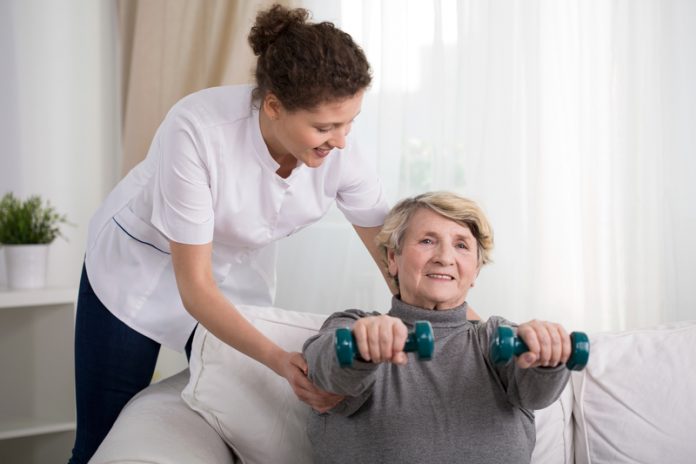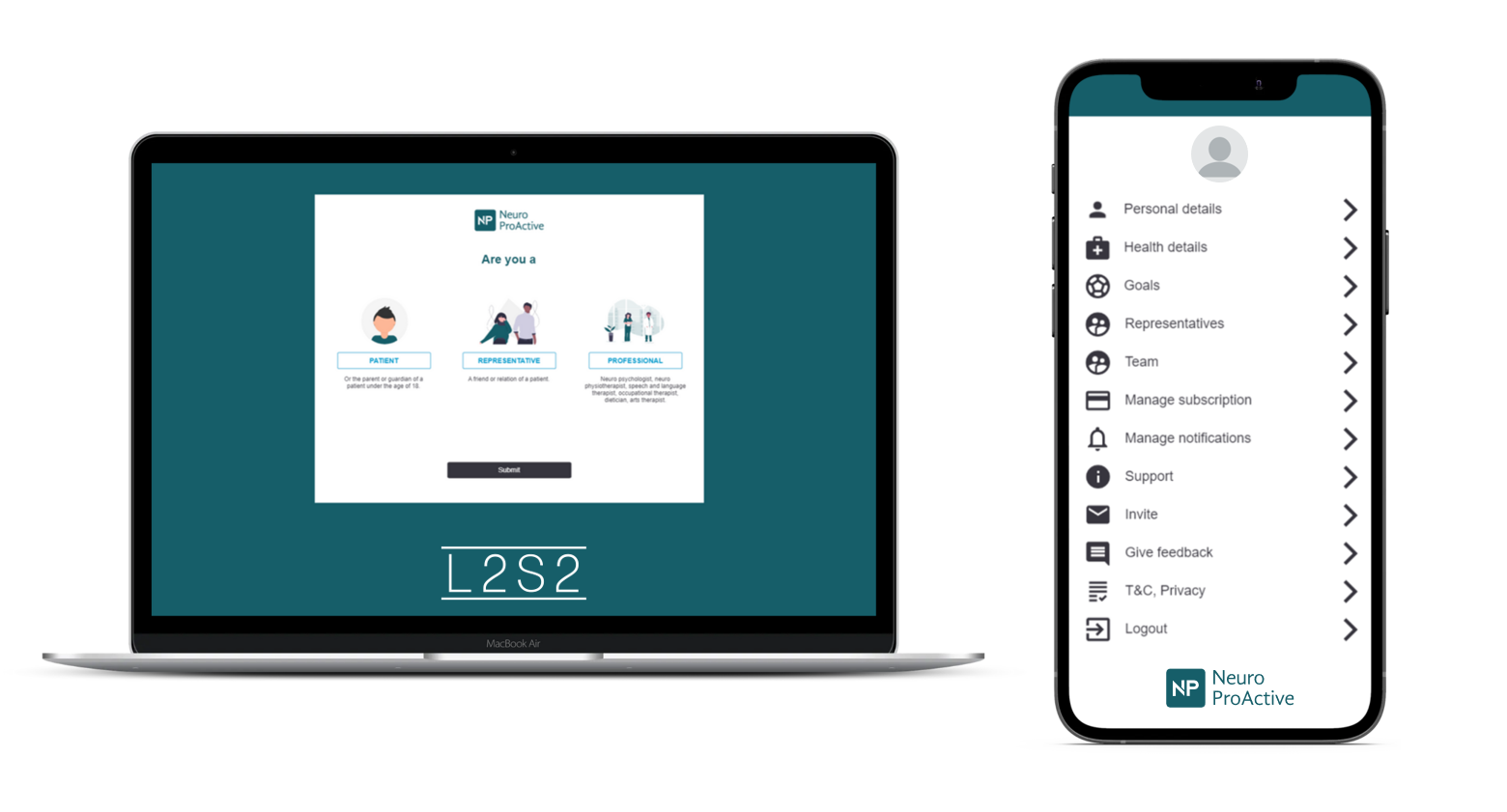L2S2 Marketing Manager Max McKiernan details the journey that led Neuro ProActive Founder, Ian Pearce, to start the development of a digital neuro rehabilitation platform
When Ian Pearce’s father suffered a stroke, Ian a former City banker, found himself on a completely unexpected journey.
Ian witnessed first-hand some of the challenges faced by people as they attempt to recover from strokes through rehabilitation. Initially, Ian was dismayed to see his father deteriorate after he was discharged from hospital. Mr Pearce senior had been largely left to get on with some exercises provided as printouts but received minimal follow-up or support to deal with the inevitable worries and distress.
This situation was unacceptable to Ian. He researched and arranged private therapy for his father to complement the NHS provision. However, he found the process much more difficult than expected and he was surprised by how the lack of coordination in rehabilitation reduced its effectiveness.
As his father started to recover, Ian decided that there had to be a better way, and so Neuro Proactive was born. Having introduced digital systems in the City, he set about to modernise neuro-rehabilitation using digital health solutions.
His starting point was the National Institute for Health and Care Excellence (NICE) guidelines for Neuro rehabilitation, which formed the baseline for Neuro ProActive. It was also informed by the NIHR Brain Injury Medtech Cooperative’s survey of unmet needs. (Neuro Proactive meets 60% of all needs identified). But most of all, the development of Neuro ProActive was shaped by the many patients and professional therapists that Ian met and interviewed.
A patient-focused, multi-disciplinary platform
What has emerged from the development process is a deeply patient-focused, multi-disciplinary team platform that supports both face to face and remote therapy delivery, particularly important since the start of the pandemic. It has distilled down the thoughts and experiences of a great number of people and addresses their needs and frustrations. The platform will soon be available both as a web service and as a phone app. At launch, Neuro ProActive will be deployed in six NHS trusts.
Neuro Proactive has been enthusiastically received by the clinical community. Professor Nick Ward is internationally recognised for his leadership in neurorehabilitation. “Neuro Proactive will allow therapists and patients to stay connected in a safe, secure way, really allowing us to tailor programmes to patients’ needs as they progress”.
A holistic view of the patient’s rehabilitation journey
Neuro Proactive lets patients create virtual multi-disciplinary teams of clinicians who can collaborate in their care. Each clinician can see the patient’s personal rehabilitation goals, and use these goals to inform the therapy they give them. They can also see the therapies that the other clinicians have given to the patient, the messages they have exchanged, and real-time feedback the patient has supplied about treatment adherence and experience: Patients can upload videos and images into their journal, letting the clinician appraise technique and gauge progress.
This holistic view of the patient’s rehabilitation journey is of tremendous value to therapists, and of course, therefore to the patients they treat. Specialists can quickly identify issues between therapy sessions and make changes to prescribed therapies. They can also ensure that they are adapting their treatment with learning from other professionals.
A crucial feature of Neuro Proactive is that it enables remote delivery of therapy. Professor Avril Drummond is a Stroke Association Trustee. In her view, “Neuro ProActive enables a consistent multidisciplinary team approach for both inpatients and those receiving community rehabilitation.”
NPA also allows the patient to nominate representatives, such as family members, friends or carers, to access their account and provide support. This can often prove vital in the continuing success of a rehabilitation programme. The representatives are able to quickly identify issues, such as the patient falling behind and provide them with the encouragement they need to stick to the therapy regime that will improve their condition. They can also intercede for patients who struggle with using technology so that these patients can also reap the benefits of the Neuro ProActive multidisciplinary team approach.
A crucial step in developing Neuro Proactive was choosing the development partner. Ian knew that the platform needed to meet the requirements of the Medical Devices Regulations. He approached L2S2 Ltd, an accredited developer of medical device grade software and data security expert.
L2S2 has developed its Managed Medical Device Cloud (MMDC) platform specifically to develop and deploy applications like Neuro ProActive. Applications automatically inherit the platform’s regulatory compliance and are easily and rapidly deployed. This was a real advantage for Ian, as the platform quite simply takes care of key development and deployment issues relating to regulatory compliance.
Leaving L2S2 to develop and deploy his application has allowed Ian to focus on refining the requirements for Neuro Proactive and informing potential users to ensure that patients with neurological diseases can realise its benefits and live better lives.
There are more than 1.2 million stroke survivors in the UK. Each year, more than 60,000 people need neurological rehabilitation following a stroke. The annual cost of care and treatment has been estimated at £26 billion1. Neurological rehabilitation also improves the lives of people with other diseases, injuries or disorders of the nervous system. It can reduce and alleviate symptoms and it improves the patient’s overall well-being2.
Neurological diseases can affect people in complex ways and patients may need treatment by clinical experts from multiple disciplines. Physiotherapy, occupational therapy, neuropsychology and speech and language therapy are routine treatments. Art therapy and music therapy are also gaining rapid recognition due to a growing evidence base. Patients gain significantly more benefit from multiple therapies if different professionals collaborate as a team.
For more information about L2S2 Ltd., please see www.l2s2.com
- https://www.nice.org.uk/Media/Default/About/what-we-do/Into-practice/measuring-uptake/NICE-Impact-stroke.pdf
- https://www.hopkinsmedicine.org/health/treatment-tests-and-therapies/neurological-rehabilitation
Please note: This is a commercial profile












